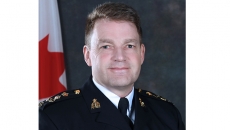I want to thank British Columbians for doing your part – for showing kindness and compassion to your friends, neighbours and family. And, finally, please continue to be kind, be calm and be safe.
People are somewhat surprised that you have handled the COVID-19 pandemic in a very calm manner. How are you able to show that level of composure?
Thank you for that. Every day that we have COVID-19 in our province, I take confidence in knowing that there is an incredible team at the BCCDC, along with our chief medical health officers, public health teams and front-line health-care workers who are 100% committed to addressing COVID-19.
You dealt with the SARS and the Ebola outbreak, has this been the most challenging outbreak?
Every outbreak that I have been a part of has been difficult, because it impacts the health and well-being of people. While public health officials around the world plan for pandemics, the size, scale and impact of COVID-19 has been huge and really unprecedented.
The lesson we can all take from this is that by working together and everyone doing their part, we can make a difference.
What has been the biggest challenge during COVID-19?
Many British Columbians have become severely ill and many others have lost their loved ones to COVID-19. This is a tragedy for all of us, and my colleagues and I feel this loss. As I have said a few times, we are all in the same storm, but we are not all in the same boat. Seeing the consequences of both COVID-19 and the measures we have had to put in place to control it, and the negative impact this has had on many families and communities is our biggest challenge. From your experience and what we have learned about COVID-19 so far, where would you put the odds of a second wave and how equipped our health system is to deal with it? COVID-19 is a tricky virus. We have learned a lot since the start of year, but there is still much to learn.
We can’t predict what might happen this Fall, but we do know COVID-19 is still circulating in our community albeit at a low level right now. There is always a potential for a surge in cases as people connect more and more activities open up. This is what we are monitoring very carefully so that we don’t get a rapid increase as we have seen in some other parts of the world. We also know that we see influenza and other respiratory illnesses start in the fall and we will need to continue to watch carefully.
While we know the precautions we have in place, such as limiting gatherings to no more than 50 people help to control the spread of the virus, the PHO team and many others are working to ensure we are ready should a surge occur.
How would you rate the response of the public on a scale of 1 to 10 as to how they have cooperated during the pandemic?
British Columbians have shown incredible resilience, courage and compassion in the face of COVID-19. Every day I see examples of how people have taken our recommendations and guidance to heart in so many positive ways. I remind everyone to keep going, because this is what will get us through this.
There has been a lot of back and forth on masks where do you stand with masks now especially that we are heading into Phase 3?
Keeping all of us safe requires layers of protection. The first thing we can do is to keep a safe distance from others. That is why there is a PHO order limiting the size of gatherings to no more than 50 people. The next layers include barriers, enhanced cleaning and clear guidelines, like the WorkSafeBC safety plans, that all businesses now need.
Non-medical cloth masks are helpful when it is challenging to maintain our distance from others. They keep our germs in and protect those around us. But we also recognize that for some people, such as those with health conditions, people with disabilities, or young children, wearing a mask is difficult. Where it isn’t possible, the other layers of protection are that much more important.
What needs to be kept in mind for the classroom when students and teachers will be in class full time in September?
A lot of thought and consideration was put into the planning for the return of in-class learning in June. I heard from many parents and educators who spoke about how important the return to classes was for so many children and families.
We are learning from what happened in June to come up with plans for September that will be able to ensure the best learning environments for all students no matter what the circumstances.
There are a lot of pharmaceutical companies and governments working towards finding a vaccine.
Any particular researches that you are keenly watching and do you feel a vaccine is the only solution out of this pandemic?
There is a lot of work being done around the world to find a vaccine or an effective treatment for COVID-19. Many are promising, but they are in the early stages. This work takes time. Until we have a vaccine, we’re going to have to monitor and manage new cases, and continue to follow our foundational rules for safe social interactions. This is what will protect all of us until more options are available.
Any timeline on when British Columbians will see signs of return to normalcy throughout the province?
We’re now well into phase three of B.C.’s Restart plan. While we may be able to further ease some restrictions, such as allowing for visitors in long-term care facilities, our ‘new normal’ and our rules for safe social interactions are going to be with us until we have an effective treatment or vaccine.
Any message to all British Columbians in the midst of COVID-19.
I want to thank British Columbians for doing your part – for showing kindness and compassion to your friends, neighbours and family.
COVID-19 has brought many challenges and as we continue to learn more and progress through this pandemic, I ask you to please keep doing what you have been doing.
Please keep your groups small, maintain a safe distance from others, wear a mask for those times when you can’t always keep that safe distance, wash your hands and always stay home when feeling ill – no matter how mild the symptoms. And, finally, please continue to be kind, be calm and be safe.



